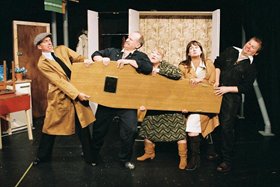Bruiser Theatre Company’s new production, Low Pay? Don’t Pay is a translation of Dario Fo’s classic piece of political comedy, Can’t Pay? Won’t Pay! Written in 1974, the play has been revised by Fo for the current economic crisis, and this translation by Joseph Farrell for the Irish and Scottish premiere of the work has a distinctive local flavour in the use of idiom and slang. Set in Milan, the central characters are two women from a low income housing estate who can no longer feed their families and pay their rising mortgages. Margherita encounters her friend Antonia on her way back from the supermarket, uncharacteristically laden down with groceries. Though at first she pretends to have won a lottery, then that she has a rich lover, Antonia eventually confides that the women rebelled at the rising prices and began to riot, chanting “Low pay? Don’t pay! Can’t pay? Won’t pay!”, taking what they needed while paying only what they could afford. But Antonia’s husband is a stickler for honesty and she knows he will disapprove of this radical action, so she enlists Margherita to help her hide the spoils. As the police arrive and the entire housing estate becomes involved, the play develops into a farce that dramatizes the struggles of the workers against the ruling class through the comic activity of two married couples and a politically radical Police Sergeant.
The work is performed in Bruiser’s characteristic style with the farcical text allowing scope for a physical slapstick comedy of scenes where the characters must move rapidly to distract each other’s attention and hide from each other all that they have stolen. The simple set is shaped with industrial-looking scaffolding to suggest the high-rise building where the characters live and their occupations as blue-collar workers, and the furniture denoting the domestic space stacks away to create the public spaces of the street. The actors change  the set while commenting to the audience on what they are doing, and details of the space are created using simple props and the actors’ bodies; so, two men holding a broom create the balcony over which the women watch the police arrive. Freeze-frames comment on the narrated action or reveal the speaker’s concealed emotions, with Margherita’s description of the supermarket protest given an additional level of comedy as the three male actors freeze in comic poses depicting moments of the action. Meanwhile Richard Doubleday, who plays multiple small roles, becomes the object of the other character’s jokes about how alike his various characters look. This self-consciousness foregrounds the storytelling nature of performance, as the actors repeatedly remind the audience that they are watching a fiction which has been deliberately constructed to comment on the actual world. This helps to smooth the transitions from slapstick comedy to political polemic, as Fo seeks to explain to the audience how the international markets impact upon the ordinary worker.
the set while commenting to the audience on what they are doing, and details of the space are created using simple props and the actors’ bodies; so, two men holding a broom create the balcony over which the women watch the police arrive. Freeze-frames comment on the narrated action or reveal the speaker’s concealed emotions, with Margherita’s description of the supermarket protest given an additional level of comedy as the three male actors freeze in comic poses depicting moments of the action. Meanwhile Richard Doubleday, who plays multiple small roles, becomes the object of the other character’s jokes about how alike his various characters look. This self-consciousness foregrounds the storytelling nature of performance, as the actors repeatedly remind the audience that they are watching a fiction which has been deliberately constructed to comment on the actual world. This helps to smooth the transitions from slapstick comedy to political polemic, as Fo seeks to explain to the audience how the international markets impact upon the ordinary worker.
These transitions are unavoidably awkward, and while some contemporary references are incorporated into the dialogue as jokes – Giovanni’s father is delighted by the classiness of the phrase "sub-prime", for example – much of the political analysis is delivered by monologue, halting the flow of the action. Fo’s attempts to update the work are similarly patchy: there are contemporary references to call centres and Lady Gaga, but the underlying philosophical structure of the work has not changed. The jokes about Catholicism and the Pope have little relevance for a largely secular contemporary society, for example, and the idealistic embrace of socialism clearly dates from pre-1989 and the disintegration of the Soviet Union. The final scenes see the unveiling of a print of Pellizza da Volpeda’s 'The Fourth Estate' (a term used here to refer to the proletariat rather than, as in common English usage, the press). The fourth estate is the great mass of people who are largely voiceless and unrepresented in the public sphere. The characters sit on the floor while Giovanni explains the picture to them and the audience, before moving towards the picture and positioning themselves to blend into the painting. The play ends with the singing of 'The Internationale'.
Despite the awkwardness of the text at times, this is a lively and entertaining production that was clearly popular with the largely young audience. While the pace sometimes dragged, as the run continues this minor problem will likely resolve itself. The actors’ performances are strong throughout and, together with the design and directing, the production has a clear and coherent style. Low Pay? Don’t Pay! will tour across Northern Ireland, and to Scotland and Cork until late October.
Lisa Fitzpatrick lectures in drama at the University of Ulster.